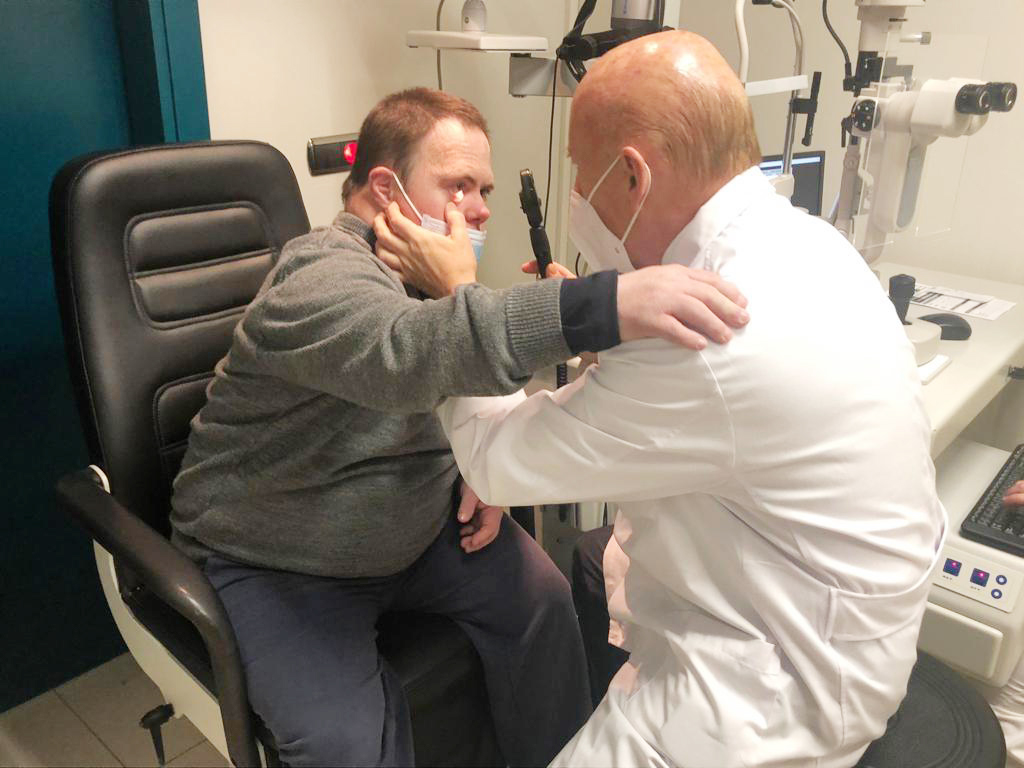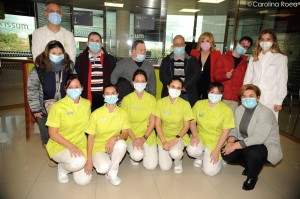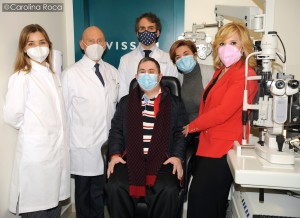
About 20 members of AIDEMAR (Association for the Integration of People with Disabilities in the Mar Menor) have been treated at Vissum Grupo Miranza Ophthalmology Center
Jorge Alió, the professor of Ophthalmology at the Miguel Hernandez University (UMH) of Elche, has been investigating the connection between Down´s syndrome and ophthalmology for more than 10 years
 Dr. Alió leads a team of professionals who are conducting free eye examinations for patients with Down´s syndrome. This group of patients is at higher risk of suffering visual loss, mainly due to corneal problems. As a result, 20 members of AIDEMAR (Association for the Integration of People with Disabilities in the Mar Menor) have already visited the Vissum Grupo Miranza Ophthalmology Center in Alicante in order to receive visual examinations. Launching this initiative, Jorge Alió Foundation hopes to examine a total of 60 patients for early detection of ocular pathologies. Dr. Alió is the professor of Ophthalmology at the Miguel Hernandez University (UMH) of Elche and has been recognized as one of the best doctors in Spain by ‘Forbes’. According to him “it is essential to detect these cases at early stages and determine which ones evolve and require treatment in order to avoid reaching advanced stages that involve corneal transplantation”.
Dr. Alió leads a team of professionals who are conducting free eye examinations for patients with Down´s syndrome. This group of patients is at higher risk of suffering visual loss, mainly due to corneal problems. As a result, 20 members of AIDEMAR (Association for the Integration of People with Disabilities in the Mar Menor) have already visited the Vissum Grupo Miranza Ophthalmology Center in Alicante in order to receive visual examinations. Launching this initiative, Jorge Alió Foundation hopes to examine a total of 60 patients for early detection of ocular pathologies. Dr. Alió is the professor of Ophthalmology at the Miguel Hernandez University (UMH) of Elche and has been recognized as one of the best doctors in Spain by ‘Forbes’. According to him “it is essential to detect these cases at early stages and determine which ones evolve and require treatment in order to avoid reaching advanced stages that involve corneal transplantation”.
Furthermore, he has explained that “it should be taken into account that corneal transplantation is particularly complex in patients with Down´s syndrome, since not only does it entail more control difficulties but there is also a higher risk of suffering from severe inflammatory reactions that can compromise the effectiveness of the transplant”.
 Dr. Alió, in collaboration with the Miguel Hernandez University (UMH) of Elche and the Polytechnic University of Cartagena, has been studying the connection between Down´s syndrome and ophthalmology for more than 10 years in a Vissum Grupo Miranza´s project that was launched by his Foundation. “We have been investigating the state and evolution of the cornea in patients with this disease, using mathematical analysis methods for the development of new diagnostic instruments for corneal pathologies“, said Dr. Alió. Different studies in this field, published in prestigious journals such as ‘JAMA Ophthalmology’, ‘British Journal of Ophthalmology’ and ‘Cornea’, have confirmed that all patients with Down´s syndrome have corneal alteration at some degree (Down keratopathy). These alterations can be mild or progressive; in the latter case preventive treatment can be applied. “These patients have thinner and more irregular corneas which, according to scientific evidence, show features compatible with those of keratoconus in more than 70% cases. Keratoconus is a progressive eye disease in which the normally round cornea thins and begins to bulge into a cone-like shape, reducing vision”, stated Dr. Alió, a leading expert in the diagnosis of keratoconus. Dr. Jorge Alió del Barrio and Dr. Alejandra Amesty have formed part of the team that has carried out different tests. Given the high occurrence of corneal pathology, the latest technology has been used to measure thickness, curvature, regularity, elasticity, etc. of the cornea. Additionally, refractive tests and complete eye examinations have been carried out, since ophthalmology patients with Down´s syndrome are also more prone to the development of cataracts at an early age and high myopia (above 6.0 – 8.0 diopters, with frequent associated ocular complications), among other pathologies.
Dr. Alió, in collaboration with the Miguel Hernandez University (UMH) of Elche and the Polytechnic University of Cartagena, has been studying the connection between Down´s syndrome and ophthalmology for more than 10 years in a Vissum Grupo Miranza´s project that was launched by his Foundation. “We have been investigating the state and evolution of the cornea in patients with this disease, using mathematical analysis methods for the development of new diagnostic instruments for corneal pathologies“, said Dr. Alió. Different studies in this field, published in prestigious journals such as ‘JAMA Ophthalmology’, ‘British Journal of Ophthalmology’ and ‘Cornea’, have confirmed that all patients with Down´s syndrome have corneal alteration at some degree (Down keratopathy). These alterations can be mild or progressive; in the latter case preventive treatment can be applied. “These patients have thinner and more irregular corneas which, according to scientific evidence, show features compatible with those of keratoconus in more than 70% cases. Keratoconus is a progressive eye disease in which the normally round cornea thins and begins to bulge into a cone-like shape, reducing vision”, stated Dr. Alió, a leading expert in the diagnosis of keratoconus. Dr. Jorge Alió del Barrio and Dr. Alejandra Amesty have formed part of the team that has carried out different tests. Given the high occurrence of corneal pathology, the latest technology has been used to measure thickness, curvature, regularity, elasticity, etc. of the cornea. Additionally, refractive tests and complete eye examinations have been carried out, since ophthalmology patients with Down´s syndrome are also more prone to the development of cataracts at an early age and high myopia (above 6.0 – 8.0 diopters, with frequent associated ocular complications), among other pathologies.
Lack of access of patients with Down´s syndrome with these visual difficulties to a specialized ophthalmology is the main factor that leads to the diagnostic delay. That is why Prof. Alió highlights the importance of this type of initiative, since “ensuring good vision plays a very important role in the personal autonomy and integration in society of this group.”
